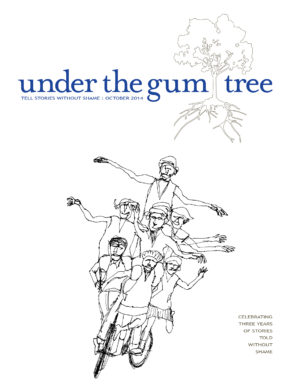Jonny Blevins

Jonny Blevins is pursuing his MFA in creative nonfiction at Chatham University. He is also a Henry Reich Teaching Fellow and student-coordinator for Chatham’s Words Without Walls program and is an active member of West Virginia University’s Appalachian Prison Book Project. In the past Jonny taught ESL in China. We are extremely happy to have given Jonny his first publication. If you want to know more about his on-goings, his doodling, his interest in adorable animals, just follow this link to his personal blog.
Jonny is also read live with us during our 3-year anniversary party. Wanna see him read his story, “Which Person She Is”? Just fast-forward to about 32:00 minutes.
From reading into the first few paragraphs—from just the first sentence even—we as readers get the significance that you didn’t grow up with your mother carrying out a domestic role,
“My mom has cooked a cocktail of from-scratch southern foods, not microwaved, not made by my father, and not purchased from a fast-food restaurant,”
We venture you weren’t accustomed to family sit-down dinners and that is why your mother was enraged when you didn’t display correct table etiquette. Is this pretty accurate?
Ha! No, my mother wasn’t typically a domestic person in terms of cooking. But I think that was our fault, and that’s what I’m only just now starting to understand. She’d try to cook something and my brother and I, even my father, would make these vomitty, extremely rude reactions to it. Maybe it was bad cooking, but we could have behaved a little more courteously, yeah? I think my mother wasn’t meant to be domestic—she was super fiery and independent.
You continue on to explain your disconnect in later years (age 9) to your peers and even your mother. However, what you underwent is a natural stage and sometimes a lengthy one that each of us experience, whether earlier or later than others. When you were confronted by your mother’s “act of desperation,” did you honestly buy into what she claimed? Or were you rebellious to those accusations at all?
I didn’t really get into it in the story, but I grew up getting slapped around until I wasn’t rebellious, so excessive whippins’ haha. And that was normal for the people I grew up around. Think ’80s country West Virginia folk—what’s the “norm” for them? I think it was normal enough for the time period. What wasn’t normal was communicating with charts—the graphic representation of that chart made sense to me because I was such a gamer, you know? Honestly sometimes, when I’m feeling especially foul, it still is something I buy into. I feel like I’m not being a good employee to life sometimes, ha.
Halfway through your chronological timeline of growing up, you come to the understanding that humans need fear and you make the bold announcement of: “I get it.” What exactly was it that culminated for you during that time? What insight did it give you into those peers you went to school with and to your mother?
I want to say that feeling fear is a good thing. When a nature writer writes about saving our planet, what do they use to persuade us with? The fear of losing all this beauty. My mother wanted to instill a fear of mediocrity, and between the white space I hope there’s an understanding that every parent is afraid of their child settling for less. Her methods just happened to be really quirky (or crazy, I guess). I think my insight was that fear is an emotion we feel in order to prepare for something. If we use that fear and adrenaline in a positive way against whatever adversity we face, we’ll be more likely to succeed.
How did you rationalize or come to understand the conception of three different (but actually all the same) women, “mother, mom, and MOMMY?” How old were you?
Kids understand a lot more than we give them credit for, of course. I can’t remember exactly when I thought I was dealing with different people, but it was pretty evident that my mom was going to be a different person every time I talked to her. As for how it’s been rationalized, well, I guess I’m still working on it. I lean toward the positive. I lean toward thinking: having two young wild boys must have been really hard.
Is it safe as readers to assume your mother did have some mental/emotional disorder?
Exactly, that’s the whole problem I run into. Is it safe to assume anyone is rightly diagnosed with most mental disorders? I wanted to write this piece as if the labels “depression,” “bipolar,” and “dissociative identity disorder” didn’t exist. I hate labels, and I know most people do in some regards. I still hate to make any definitive claims on this, because we don’t actually understand psychology. It’s all guess work. How could I pin this person with something if she was simply too stressed out to deal with kidsat the time?
Until your time in high school, your family seemed to exist satisfactorily without the knowledge that maybe there was something to investigate. How much of this do you think was just ignoring signs?
All of it was ignoring the signs. All of it certainly, was ignoring at least a good discussion. Recently my mother (who’s really mellowed out with new medicine, age, and probably more acceptance of herself) will allow me to talk to her more openly about what could have been better in my life and her life, and she seems to want nothing more than forgiveness, as do I. And of course I forgive her, as if there were anything to forgive. It’s never that I resented her for any of the crazy stuff (the more severe stories I don’t choose to share), it’s that I was angry I couldn’t figure her out or just have normalcy, whatever that means. I think that’s what is so terrifying about writing creative nonfiction for me. I’m busy trying to create the content, friendly, totally peaceful family I didn’t grow up with (including myself), and stories like these feel in so many ways like it would damage what I’m working really hard to fix. To be totally candid with you, I mull over whether this degree is worth it or not almost on a daily basis.
Is that why in your last line you say you felt “like a traitor,” when agreeing with your father’s conclusion?
Yeah. I felt like a traitor because I was just ignoring this wounded woman. That’s the only reason I feel okay submitting this kind of work—maybe someone will read my work someday and say, “Oh man, me too,” and they’ll try to do something about it.
What with the wildness of your mother during the Washington D.C. trip she chaperoned, and all the sex-ed she offered your schoolmates, we’re nosey to learn if she educated you similarly in that awkward-way-parents-will-tell-their-children, or if that was purely something she did to gain popularity amongst your peers?
That’s a great question. I can’t remember any time she ever talked to my brother or me about sex-ed. She felt more comfortable around girls, she wanted to be their friends, and if we’re really digging, it’s becoming clear to me that in doing these goofy kinds of things, I think she wanted to find a piece of her childhood she never got to live. Her dad was an extremely strict Bible-thumping kind of man of Italian lineage who overcame alcoholism. They all laugh about it now, but I’m sure my grandpa was hard to grow up with, all of that not to say he’s a bad person either.
What turned you on to writing Creative Nonfiction?
I decided to join a creative nonfiction program because Chatham University has a program that allows students to go into the county jail and teach. I love that. Hearing those stories has been more valuable to me than anything else. But I came to the program expecting to write about literary journalism or oral histories. I wanted to write about living in China or to write about social justice. Instead, it’s been mostly all about family structure, and that’s been a fine surprise. I’ve really opened up in ways I never expected to.
Do you find yourself writing a lot of about family?
Unfortunately, haha. I guess, like writers and professors say, if you keep coming back to the same subjects, then you’re not done writing about it. I hope to be finished writing about family structure soon.
This is only your first publication, (among many to come we are sure) what other pieces are you most excited about, either finished or in-progress, that you are submitting?
I’m currently writing a lot about growing up with video games and that’s really exciting. Again, a lot of times I’ll be writing an essay about playing Final Fantasy and suddenly it’s a story about fighting with my brother or ignoring my mom. I guess my brain just isn’t finished with that subject, yet.




